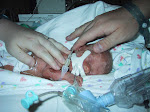 Here are a few helpful suggestions if you are a first time NICU parent. These suggestions come from the March of Dimes website on Prematurity Awareness. See their website for more information on dealing with a premature birth.
Here are a few helpful suggestions if you are a first time NICU parent. These suggestions come from the March of Dimes website on Prematurity Awareness. See their website for more information on dealing with a premature birth.If your baby was premature, most likely you're still reeling from the shock of your baby's arrival weeks or months before the due date. You may never have fully adjusted to being pregnant, much less to being a new parent. You may feel distant from your baby—and the busy, hectic neonatal intensive care unit (NICU) environment doesn't make it any easier. But this is an important time for you and your baby to get to know each other and for you to gradually take on your important role as Mom or Dad.
Feeling More Confident
Here are some suggestions to help you feel more confident as a parent in the NICU:
- If this is your first baby, remind yourself that all new parents feel anxious and unsure. Of course, these feelings are more intense because you have a baby in the NICU, but they are also a natural part of being a first-time parent.
- Even if you're an experienced parent, you may feel anxious and unsure. Remember that parenting in the NICU is different and challenging. It's natural to feel like a beginner as you learn how to meet your baby's unique needs.
- Be patient with yourself when you feel awkward or hesitant. Nobody expects you to be comfortable with your baby right away. Give yourself the time you need to adjust and feel more confident with your baby.
- If you are afraid to make mistakes or show your inexperience, you may find yourself backing away from your baby. Try telling your baby's nurses that you're unsure of yourself. They can give you the support and practice you need to become skilled at taking care of your baby.
The more you know about your baby's medical condition and care, the more you can look out for his best interests and be his advocate. And the more you know, the more you can take care of him and collaborate with his medical team.
Ask Questions:
It's normal to have many questions about your baby's medical condition and what the future may hold. You may want a lot of information right away, or you may need more time before you can hear the answers. You may have to ask some questions several times because the answers can be too much to take in all at once. Sometimes there are no definite answers to your questions, but learning what is known can help relieve some of the uncertainty.
To get information at a comfortable pace, let your questions be your guide. Write down your questions as you think of them so that you can seek the answers when you're ready. Ask your baby's doctors for written information. Take notes so you can review and remember their answers. You can also invite a trusted family member or friend to join you if you want another pair of ears to hear important information.
Questions to Ask
- How is my baby doing today?
- Has anything changed?
- What caused this condition?
- How will this equipment or medication help my baby?
- What types of tests are being given to my baby and what information will they provide?
- Who is in charge of my baby's medical care?
- Who should I call if I have questions about my baby's condition?
- How will I be informed of any major change in my baby's condition?
- Can I hold my baby?
- What can I do to take care of my baby?
From the start, make it your goal to form a good working relationship with the neonatal intensive care unit (NICU) staff. As you get to know your baby's doctors and nurses, you will feel more comfortable approaching them and asking questions or making suggestions. Ask them to keep you informed about your baby's medical condition. When there are choices about your baby's care, you should be included in making those important decisions. After all, you and your baby's medical caregivers are a team. You all share the same goal: the best care for your baby.
Prepare for Uncertainty
Sometimes you may feel anxious about what you learn. But it can be even more frightening when you don't know what's going on or what to expect. Uncertainty is a common part of the NICU experience. But as you learn more about your baby's condition and treatments, you'll feel more in control of the situation. The more you know, the more involved you can be and the more you can advocate for your baby.
Visit these links for more information:
Parenting in the NICU
Coping with the NICU Experience
Friends and Family
Leaving the NICU
















No comments:
Post a Comment